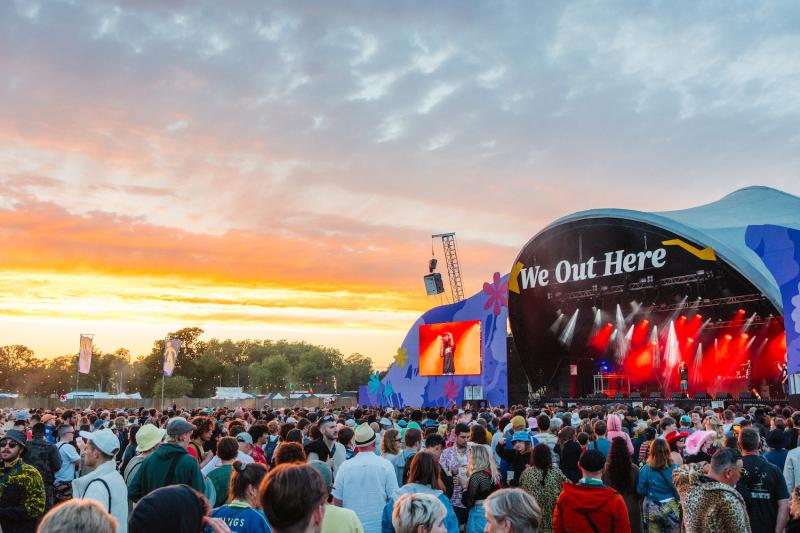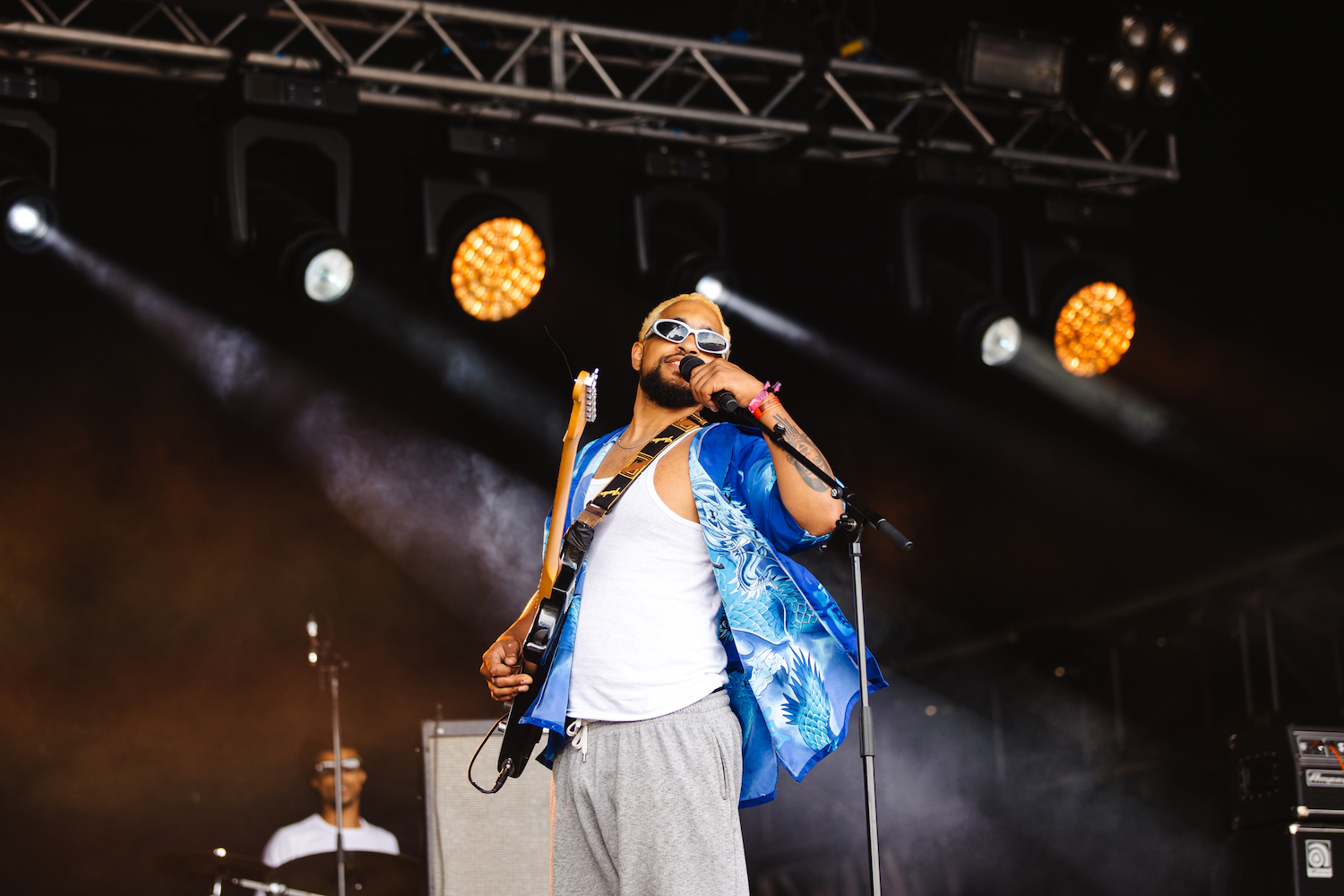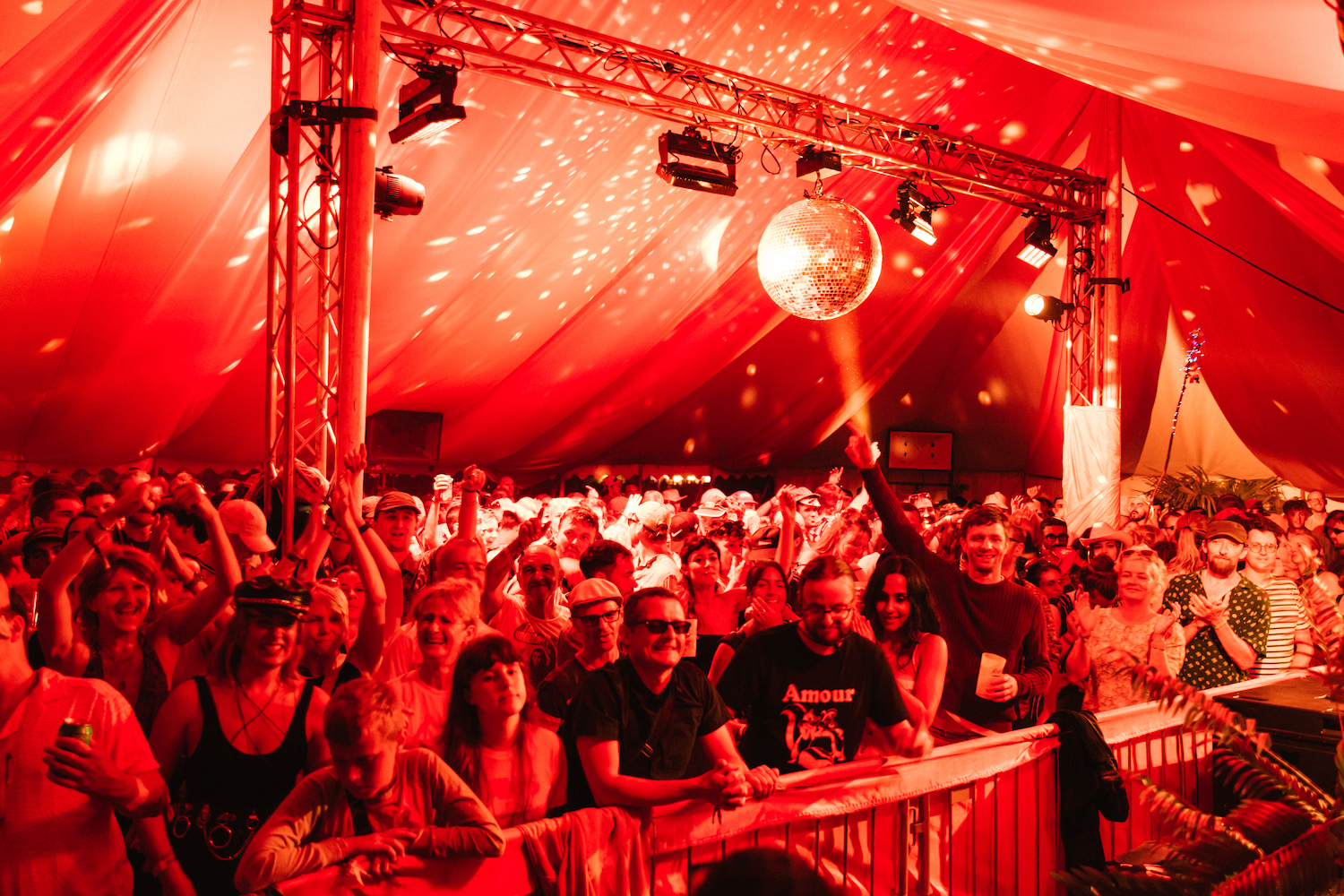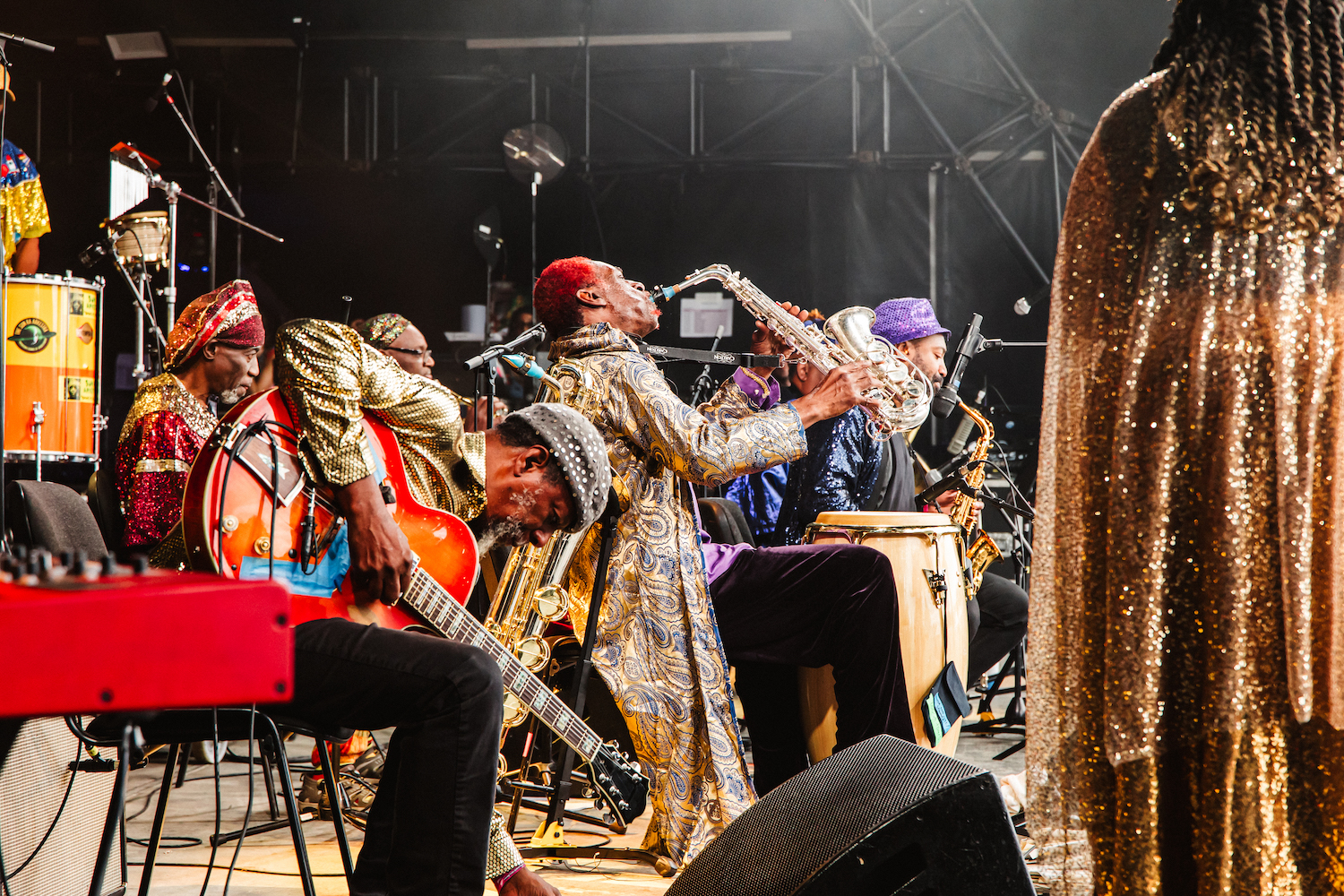We Out Here Festival, Wimborne St Giles review: it's a family affair, and then some | reviews, news & interviews
We Out Here Festival, Wimborne St Giles review: it's a family affair, and then some...
We Out Here Festival, Wimborne St Giles review: it's a family affair, and then some...
Legacy, gratitude, and an embarrassment of good grooves in the Dorset greenery

We Out Here Festival, now in its fifth year (and fourth edition, as 2020 was of course cancelled for Covid), has become an institution.
The diversity of the crowd is the first thing you’ll notice about the festival. Though it has grown a lot since its test run in 2019, and this year relocated from Cambridgeshire to Dorset, it has retained pretty much the same profile it started with. You’d be hard pressed to find another event that has such a representative racial, gender and age mix, with attendees from across the country and increasingly across the world, with an even spread from teens to their 80s.
The vibe is consistently as good as you’ll find anywhere, too. It helps that this is built around a very close knit and collaborative set of musical communities, so wherever you look you’ll consistently see and hear the delight of old friends bumping into one another. But even among strangers there’s an easy-going sense of shared mission, so whether you’re watching an extended saxophone solo mid afternoon (there are a lot of extended saxophone solos), or shocking out to drum’n’bass at 3am (there’s a LOT of drum’n’bass), the crowd around you will feel equally committed to the experience and there’s an underlying sense of safety and companionship.
My experience this year was a little of a blurry whirl, as on my first night there I had to DJ myself from 1-4am. It was just an ambient set in a relatively tiny tea tent, but it meant as soon as I was there I was in action, and the enirety of the weekend after that was spent in dazed motion unsure of what time it was at any point. That was fine, though, it’s precisely the sort of festival you can navigate by instinct – however wonky – and guarantee a good time.
 I missed the Thursday but as soon as I got to the campsite I knew I was properly in We Out Here as setting my tent up was soundtracked by Dave Okumu & The Seven Generations on the main stage – a choir, heavyweight dub bass and martial jazz horns blasting Okumu’s messages of politics, history and self-realisation to the heavens.
I missed the Thursday but as soon as I got to the campsite I knew I was properly in We Out Here as setting my tent up was soundtracked by Dave Okumu & The Seven Generations on the main stage – a choir, heavyweight dub bass and martial jazz horns blasting Okumu’s messages of politics, history and self-realisation to the heavens.
From there on in, the highlights just kept coming wherever I landed. DJ Ruf Dug sent the small Lemon Lounge tent into utter delirium mid afternoon with vintage sounding house and reggae. His fellow Mancunians Space Afrika delivered brooding ambient with cityscape visuals as the sun went down. Miles Romans-Hopcraft, aka Wu-Lu (pictured above) showed ably that his blend of Tricky, jungle and punk works a treat on the live stage.
The Mauskovic Dance Band had an audience ecstatic dancing to sinewy post-punk like a hyperactive ESG. Knucks injected intense philosophising into London’s drill rap sound in a super charismatic solo performance. DJ NikNak delivered a bravura set of tracks by only women rappers. Terry Farley got three or more generations packing out another dancefloor with his high energy house and impeccable mixing. Goldie shouted and glared as his live band kicked up a dementedly complex clatter. And all this before 11pm and the dance areas getting going in earnest.
Saturday began again with a “you are definitely at We Out Here” cobweb-blowing-away set from saxophonist Chelsea Carmichael – she and her band delivering all the intense groove, heavy dub influence and sonic exploration of when I saw them at EartH, Hackney this year but with infinitely better sound quality. Which is another key to this festival: the crispness and clarity of sound on even the smallest stages not only addes to musical appreciation, but contributes to the intangible vibe. The soundsystems are just more pleasant to be around than most, and that lifts the mood consistently.
Carmichael was followed by Jimetta Rose And The Voices of Creation – a community pan-spiritual gospel choir from Los Angeles, led by the staggeringly charismatic Rose and sending the ever-accumulating crowd into ecstasies. Even on barely three hours sleep and a fearsome hangover, I was uplifted, transported and overjoyed by the set. Which was handy, as Rose was omnipresent on the Saturday: she also appeared in the talks tent, a firehose of enthusiasm and information as she detailed her spiritual and practical outlook on life – and the Voices Of Creation reprised their set, with added dance beats, to an even more ecstatically dancing crowd in the Brawnswood tent mid evening.
 Futher treats came in the form of Brightonian Alice Russell’s straightforward soul-funk, and 79 year old Brazilian Marcos Valle’s bossa-nova-disco – then came a serious heavyweight one-two from Mala and Joe Armon-Jones followed by Nubya Garcia. In fact, saxophonist Garcia was also part of Mala and Armon-Jones’s band – and was greeted by the crowd like a rock star when she soloed over their apocalyptically heavy dub and percussion jams… as well she might given that she, like Armon-Jones, is emblematic of the young London jazz generation who form the backbone of this festival.
Futher treats came in the form of Brightonian Alice Russell’s straightforward soul-funk, and 79 year old Brazilian Marcos Valle’s bossa-nova-disco – then came a serious heavyweight one-two from Mala and Joe Armon-Jones followed by Nubya Garcia. In fact, saxophonist Garcia was also part of Mala and Armon-Jones’s band – and was greeted by the crowd like a rock star when she soloed over their apocalyptically heavy dub and percussion jams… as well she might given that she, like Armon-Jones, is emblematic of the young London jazz generation who form the backbone of this festival.
Throughout both sets – indeed throughout the festival – when the artists got on the mic, the words “gratitude” and “legacy” abound. The interconnectedness of these bands is endless, with members of Ezra Collective and the wider Tomorrow’s Warriors jazz youth programme popping up in various bands throughout the weekend. And it’s clear that all were proud and grateful to be playing on the same stages as older legends of jazz and other global sounds, and that the sense of connection isn’t just within one generation but across many – echoing the comfortable all-ages audiences.
All of this made the frequent political and/or anti-establishement utterances from artists feel much weightier than otherwise they might. We Out Here is demonstrably a family affair, a resilient structure of lifelong relationships built on thousands of hours spent in creative envirnonments, and commitment to a loose, diverse but very real scene. The diversity and good natured, knowledgable passion of its crowd is testament that the good vibes are more than just a fuzzy feeling but reflect a concrete conviction that there are better ways of living and interacting. This sense of a living, resilient counterculture was omnipresent, and only very rarely tipped over into new age woo or antivax conspricacy theory – when it did it was sad to hear, but it was the exception and you’d hear worse in any pub on any night of the week.
Róisín Murphy sadly pulled out as headliner on the Saturday through illness, and was replaced by a capable DJ set from Bonobo, but by this time I was delirious and wanted disco – which I got in bucketload from Horsemeat Disco and then Colleen “Cosmo” Murphy. The night devolved into stumbling through various dance areas discovering dance genres I didn’t know existed and having cosmic conversations with old friends until I turned in relatively early.
Sunday again started with a bang, thanks to a set from Swedish-based Nigerian-British polymath Joshua Idehen. In impeccable tailoring, he delivered a set that was part motivational seminar, part stand-up comedy routine, and all rave energy thanks to beats by Ludvig Parment – blurring together The Streets, Talking Heads (including a spine-tingling cover of “Once in a Lifetime”) and finger-jabbing West African preacher into one wildly charistmatic whole. He was followed by a heart-warmingly well receved performance from Gil Scott Heron collaborator Brian Jackson, then a lush soul-jazz-R&B set by Yazmin Lacey who delivered everything with wry East London wit, and covered Sade’s “Sweetest Taboo” – again giving that sense of this music as living tradition.
I took an afternoon break from live music for an hour of pure reggae played by Channel One soundystem to a vast, wildly dancing crowd. Then, in the Big Top tent, I found Yorkshire producer/composer/saxophonist Greg Surmacz and his trio turning his uniquely wonky and pastoral electronic hip hop jazz into new forms – having always wondered how he could deliver his complex sonics live, this was a delightful surprise – then the Tomorrow’s Warriors Youth Group, all still in their early-mid teens bashing out some fearsome playing. Finally I stumbled back to the main stage for the Sun Ra Arkestra, and found myself almost instantly taken to Saturn.
 It’s absolutely extraordinary that even after the passing of Sun Ra, his right hand man Marshall Allen – now 99 – is able to not just channel the sound he created, but continue it like a river flowing forward. The Arkestra was always a loose affair, and now contains a huge range of ages, but skews towards musicians in their 70s and up, yet it sounds nothing like a museum piece: it is, as Sun Ra’s music always was no matter how dissonant or weird it got, about FUN above all. As they sung of space and escape and built layers of jangling percussion and circling horn riffs, to be able to be in a field and hear this really did feel like a privilege.
It’s absolutely extraordinary that even after the passing of Sun Ra, his right hand man Marshall Allen – now 99 – is able to not just channel the sound he created, but continue it like a river flowing forward. The Arkestra was always a loose affair, and now contains a huge range of ages, but skews towards musicians in their 70s and up, yet it sounds nothing like a museum piece: it is, as Sun Ra’s music always was no matter how dissonant or weird it got, about FUN above all. As they sung of space and escape and built layers of jangling percussion and circling horn riffs, to be able to be in a field and hear this really did feel like a privilege.
I had to bail after the Arkestra, sadly missing Cymande, Black Star and Ezra Collective – but by this point I had inured myself to FOMO, thorugh the fact that it had quickly become clear that whatever you saw over this weekend, you’d be missing dozens of other outrageously great acts. This wasn’t the perfect festival: the wide open space of the new site meant some occasionally draconian volume restrictions on some stages at times, and from some points finding a toilet was a trek. But these are mere quibbles. In terms of the content, the culture, the feeling, the crowd and the sounds that came out of the speakers – everything that truly matters – this could not have been better.
rating
Explore topics
Share this article
Add comment
The future of Arts Journalism
You can stop theartsdesk.com closing!
We urgently need financing to survive. Our fundraising drive has thus far raised £49,000 but we need to reach £100,000 or we will be forced to close. Please contribute here: https://gofund.me/c3f6033d
And if you can forward this information to anyone who might assist, we’d be grateful.

Subscribe to theartsdesk.com
Thank you for continuing to read our work on theartsdesk.com. For unlimited access to every article in its entirety, including our archive of more than 15,000 pieces, we're asking for £5 per month or £40 per year. We feel it's a very good deal, and hope you do too.
To take a subscription now simply click here.
And if you're looking for that extra gift for a friend or family member, why not treat them to a theartsdesk.com gift subscription?
more New music
 theartsdesk Q&A: Soft Cell
Upon the untimely passing of Dave Ball we revisit our September 2018 Soft Cell interview
theartsdesk Q&A: Soft Cell
Upon the untimely passing of Dave Ball we revisit our September 2018 Soft Cell interview
 Demi Lovato's ninth album, 'It's Not That Deep', goes for a frolic on the dancefloor
US pop icon's latest is full of unpretentious pop-club bangers
Demi Lovato's ninth album, 'It's Not That Deep', goes for a frolic on the dancefloor
US pop icon's latest is full of unpretentious pop-club bangers
 Yazmin Lacey confirms her place in a vital soul movement with 'Teal Dreams'
Intimacy and rich poetry on UK soul star's second LP
Yazmin Lacey confirms her place in a vital soul movement with 'Teal Dreams'
Intimacy and rich poetry on UK soul star's second LP
 Solar Eyes, Hare & Hounds, Birmingham review - local lads lay down some new tunes for a home crowd
Psychedelic indie dance music marinated in swirling dry ice
Solar Eyes, Hare & Hounds, Birmingham review - local lads lay down some new tunes for a home crowd
Psychedelic indie dance music marinated in swirling dry ice
 The Lemonheads' 'Love Chant' is a fine return to form
Evan Dando finally gets back in the saddle with an album of new tunes
The Lemonheads' 'Love Chant' is a fine return to form
Evan Dando finally gets back in the saddle with an album of new tunes
 Music Reissues Weekly: Evie Sands - I Can’t Let Go
Diligent, treasure-packed tribute to one of Sixties’ America’s great vocal stylists
Music Reissues Weekly: Evie Sands - I Can’t Let Go
Diligent, treasure-packed tribute to one of Sixties’ America’s great vocal stylists
 'Deadbeat': Tame Impala's downbeat rave-inspired latest
Fifth album from Australian project grooves but falls flat
'Deadbeat': Tame Impala's downbeat rave-inspired latest
Fifth album from Australian project grooves but falls flat
 Heartbreak and soaring beauty on Chrissie Hynde & Pals' Duets Special
The great Pretender at her most romantic and on the form of her life
Heartbreak and soaring beauty on Chrissie Hynde & Pals' Duets Special
The great Pretender at her most romantic and on the form of her life
 The Last Dinner Party's 'From the Pyre' is as enjoyable as it is over-the-top
Musically sophisticated five-piece ramp up the excesses but remain contagiously pop
The Last Dinner Party's 'From the Pyre' is as enjoyable as it is over-the-top
Musically sophisticated five-piece ramp up the excesses but remain contagiously pop
 Moroccan Gnawa comes to Manhattan with 'Saha Gnawa'
Trance and tradition meet Afrofuturism in Manhattan
Moroccan Gnawa comes to Manhattan with 'Saha Gnawa'
Trance and tradition meet Afrofuturism in Manhattan
 Soulwax’s 'All Systems Are Lying' lays down some tasty yet gritty electro-pop
Belgian dancefloor veterans return to the fray with a dark, pop-orientated sound
Soulwax’s 'All Systems Are Lying' lays down some tasty yet gritty electro-pop
Belgian dancefloor veterans return to the fray with a dark, pop-orientated sound
 Music Reissues Weekly: Marc and the Mambas - Three Black Nights Of Little Black Bites
When Marc Almond took time out from Soft Cell
Music Reissues Weekly: Marc and the Mambas - Three Black Nights Of Little Black Bites
When Marc Almond took time out from Soft Cell

Comments
What a great summing up! I
What a great summing up! I also struggled with fomo and in the end just gave in to feeling moments of delight and pleasure as I came accross them, in between main sets and randomly as I felt like. Finding incredible musicians and vocalists giving their all for everyone's enjoyment. And yes, I echo the loss of Thursday which was a blur and I hope to make up for this next time. Amongst so many artists Channel One's set must have been directed at my tent. Just class set and sound quality crisp. And I'm picky.
I also rather guttedly missed Cymande, Blackstar and Ezra C but this was in favour of 'The Bowl' DJ sets which was a a truly epic end to a simply fabulous and memorable weekend. I met and talked to so many people and never thought I could feel so at home somwhere else. By the way stunning new location. A very grateful cheers to the GP team and all those many hard workers who contributed to make it happen. Xx